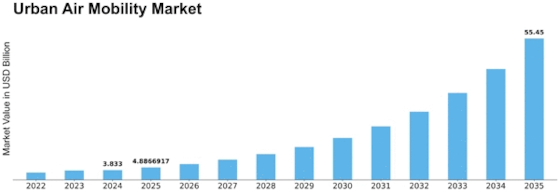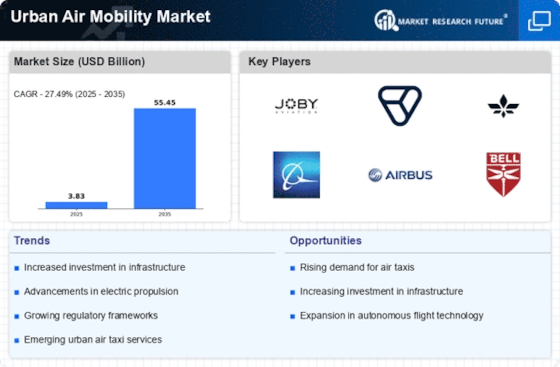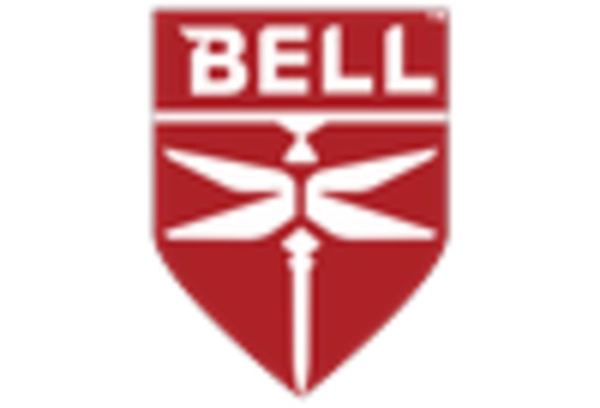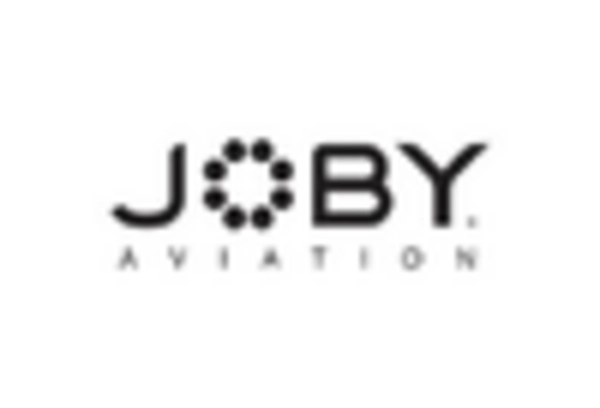Passenger Transport
Cargo Transport
Emergency Medical Services
Tourism
Electric Vertical Takeoff and Landing
Hybrid Vertical Takeoff and Landing
Cargo Drones
Passenger Drones
Autonomous Systems
Electric Propulsion
Air Traffic Management Solutions
Flight Control Systems
Urban Commute
Regional Travel
Commercial Logistics
North America
Europe
South America
Asia Pacific
Middle East and Africa
North America Outlook (USD Billion, 2019-2035)
Urban Air Mobility Market by Application Type
Passenger Transport
Cargo Transport
Emergency Medical Services
Tourism
Urban Air Mobility Market by Vehicle Type
Electric Vertical Takeoff and Landing
Hybrid Vertical Takeoff and Landing
Cargo Drones
Passenger Drones
Urban Air Mobility Market by Technology Type
Autonomous Systems
Electric Propulsion
Air Traffic Management Solutions
Flight Control Systems
Urban Air Mobility Market by End Use Type
Urban Commute
Regional Travel
Commercial Logistics
Urban Air Mobility Market by Regional Type
US
Canada
US Outlook (USD Billion, 2019-2035)
Urban Air Mobility Market by Application Type
Passenger Transport
Cargo Transport
Emergency Medical Services
Tourism
Urban Air Mobility Market by Vehicle Type
Electric Vertical Takeoff and Landing
Hybrid Vertical Takeoff and Landing
Cargo Drones
Passenger Drones
Urban Air Mobility Market by Technology Type
Autonomous Systems
Electric Propulsion
Air Traffic Management Solutions
Flight Control Systems
Urban Air Mobility Market by End Use Type
Urban Commute
Regional Travel
Commercial Logistics
CANADA Outlook (USD Billion, 2019-2035)
Urban Air Mobility Market by Application Type
Passenger Transport
Cargo Transport
Emergency Medical Services
Tourism
Urban Air Mobility Market by Vehicle Type
Electric Vertical Takeoff and Landing
Hybrid Vertical Takeoff and Landing
Cargo Drones
Passenger Drones
Urban Air Mobility Market by Technology Type
Autonomous Systems
Electric Propulsion
Air Traffic Management Solutions
Flight Control Systems
Urban Air Mobility Market by End Use Type
Urban Commute
Regional Travel
Commercial Logistics
Europe Outlook (USD Billion, 2019-2035)
Urban Air Mobility Market by Application Type
Passenger Transport
Cargo Transport
Emergency Medical Services
Tourism
Urban Air Mobility Market by Vehicle Type
Electric Vertical Takeoff and Landing
Hybrid Vertical Takeoff and Landing
Cargo Drones
Passenger Drones
Urban Air Mobility Market by Technology Type
Autonomous Systems
Electric Propulsion
Air Traffic Management Solutions
Flight Control Systems
Urban Air Mobility Market by End Use Type
Urban Commute
Regional Travel
Commercial Logistics
Urban Air Mobility Market by Regional Type
Germany
UK
France
Russia
Italy
Spain
Rest of Europe
GERMANY Outlook (USD Billion, 2019-2035)
Urban Air Mobility Market by Application Type
Passenger Transport
Cargo Transport
Emergency Medical Services
Tourism
Urban Air Mobility Market by Vehicle Type
Electric Vertical Takeoff and Landing
Hybrid Vertical Takeoff and Landing
Cargo Drones
Passenger Drones
Urban Air Mobility Market by Technology Type
Autonomous Systems
Electric Propulsion
Air Traffic Management Solutions
Flight Control Systems
Urban Air Mobility Market by End Use Type
Urban Commute
Regional Travel
Commercial Logistics
UK Outlook (USD Billion, 2019-2035)
Urban Air Mobility Market by Application Type
Passenger Transport
Cargo Transport
Emergency Medical Services
Tourism
Urban Air Mobility Market by Vehicle Type
Electric Vertical Takeoff and Landing
Hybrid Vertical Takeoff and Landing
Cargo Drones
Passenger Drones
Urban Air Mobility Market by Technology Type
Autonomous Systems
Electric Propulsion
Air Traffic Management Solutions
Flight Control Systems
Urban Air Mobility Market by End Use Type
Urban Commute
Regional Travel
Commercial Logistics
FRANCE Outlook (USD Billion, 2019-2035)
Urban Air Mobility Market by Application Type
Passenger Transport
Cargo Transport
Emergency Medical Services
Tourism
Urban Air Mobility Market by Vehicle Type
Electric Vertical Takeoff and Landing
Hybrid Vertical Takeoff and Landing
Cargo Drones
Passenger Drones
Urban Air Mobility Market by Technology Type
Autonomous Systems
Electric Propulsion
Air Traffic Management Solutions
Flight Control Systems
Urban Air Mobility Market by End Use Type
Urban Commute
Regional Travel
Commercial Logistics
RUSSIA Outlook (USD Billion, 2019-2035)
Urban Air Mobility Market by Application Type
Passenger Transport
Cargo Transport
Emergency Medical Services
Tourism
Urban Air Mobility Market by Vehicle Type
Electric Vertical Takeoff and Landing
Hybrid Vertical Takeoff and Landing
Cargo Drones
Passenger Drones
Urban Air Mobility Market by Technology Type
Autonomous Systems
Electric Propulsion
Air Traffic Management Solutions
Flight Control Systems
Urban Air Mobility Market by End Use Type
Urban Commute
Regional Travel
Commercial Logistics
ITALY Outlook (USD Billion, 2019-2035)
Urban Air Mobility Market by Application Type
Passenger Transport
Cargo Transport
Emergency Medical Services
Tourism
Urban Air Mobility Market by Vehicle Type
Electric Vertical Takeoff and Landing
Hybrid Vertical Takeoff and Landing
Cargo Drones
Passenger Drones
Urban Air Mobility Market by Technology Type
Autonomous Systems
Electric Propulsion
Air Traffic Management Solutions
Flight Control Systems
Urban Air Mobility Market by End Use Type
Urban Commute
Regional Travel
Commercial Logistics
SPAIN Outlook (USD Billion, 2019-2035)
Urban Air Mobility Market by Application Type
Passenger Transport
Cargo Transport
Emergency Medical Services
Tourism
Urban Air Mobility Market by Vehicle Type
Electric Vertical Takeoff and Landing
Hybrid Vertical Takeoff and Landing
Cargo Drones
Passenger Drones
Urban Air Mobility Market by Technology Type
Autonomous Systems
Electric Propulsion
Air Traffic Management Solutions
Flight Control Systems
Urban Air Mobility Market by End Use Type
Urban Commute
Regional Travel
Commercial Logistics
REST OF EUROPE Outlook (USD Billion, 2019-2035)
Urban Air Mobility Market by Application Type
Passenger Transport
Cargo Transport
Emergency Medical Services
Tourism
Urban Air Mobility Market by Vehicle Type
Electric Vertical Takeoff and Landing
Hybrid Vertical Takeoff and Landing
Cargo Drones
Passenger Drones
Urban Air Mobility Market by Technology Type
Autonomous Systems
Electric Propulsion
Air Traffic Management Solutions
Flight Control Systems
Urban Air Mobility Market by End Use Type
Urban Commute
Regional Travel
Commercial Logistics
APAC Outlook (USD Billion, 2019-2035)
Urban Air Mobility Market by Application Type
Passenger Transport
Cargo Transport
Emergency Medical Services
Tourism
Urban Air Mobility Market by Vehicle Type
Electric Vertical Takeoff and Landing
Hybrid Vertical Takeoff and Landing
Cargo Drones
Passenger Drones
Urban Air Mobility Market by Technology Type
Autonomous Systems
Electric Propulsion
Air Traffic Management Solutions
Flight Control Systems
Urban Air Mobility Market by End Use Type
Urban Commute
Regional Travel
Commercial Logistics
Urban Air Mobility Market by Regional Type
China
India
Japan
South Korea
Malaysia
Thailand
Indonesia
Rest of APAC
CHINA Outlook (USD Billion, 2019-2035)
Urban Air Mobility Market by Application Type
Passenger Transport
Cargo Transport
Emergency Medical Services
Tourism
Urban Air Mobility Market by Vehicle Type
Electric Vertical Takeoff and Landing
Hybrid Vertical Takeoff and Landing
Cargo Drones
Passenger Drones
Urban Air Mobility Market by Technology Type
Autonomous Systems
Electric Propulsion
Air Traffic Management Solutions
Flight Control Systems
Urban Air Mobility Market by End Use Type
Urban Commute
Regional Travel
Commercial Logistics
INDIA Outlook (USD Billion, 2019-2035)
Urban Air Mobility Market by Application Type
Passenger Transport
Cargo Transport
Emergency Medical Services
Tourism
Urban Air Mobility Market by Vehicle Type
Electric Vertical Takeoff and Landing
Hybrid Vertical Takeoff and Landing
Cargo Drones
Passenger Drones
Urban Air Mobility Market by Technology Type
Autonomous Systems
Electric Propulsion
Air Traffic Management Solutions
Flight Control Systems
Urban Air Mobility Market by End Use Type
Urban Commute
Regional Travel
Commercial Logistics
JAPAN Outlook (USD Billion, 2019-2035)
Urban Air Mobility Market by Application Type
Passenger Transport
Cargo Transport
Emergency Medical Services
Tourism
Urban Air Mobility Market by Vehicle Type
Electric Vertical Takeoff and Landing
Hybrid Vertical Takeoff and Landing
Cargo Drones
Passenger Drones
Urban Air Mobility Market by Technology Type
Autonomous Systems
Electric Propulsion
Air Traffic Management Solutions
Flight Control Systems
Urban Air Mobility Market by End Use Type
Urban Commute
Regional Travel
Commercial Logistics
SOUTH KOREA Outlook (USD Billion, 2019-2035)
Urban Air Mobility Market by Application Type
Passenger Transport
Cargo Transport
Emergency Medical Services
Tourism
Urban Air Mobility Market by Vehicle Type
Electric Vertical Takeoff and Landing
Hybrid Vertical Takeoff and Landing
Cargo Drones
Passenger Drones
Urban Air Mobility Market by Technology Type
Autonomous Systems
Electric Propulsion
Air Traffic Management Solutions
Flight Control Systems
Urban Air Mobility Market by End Use Type
Urban Commute
Regional Travel
Commercial Logistics
MALAYSIA Outlook (USD Billion, 2019-2035)
Urban Air Mobility Market by Application Type
Passenger Transport
Cargo Transport
Emergency Medical Services
Tourism
Urban Air Mobility Market by Vehicle Type
Electric Vertical Takeoff and Landing
Hybrid Vertical Takeoff and Landing
Cargo Drones
Passenger Drones
Urban Air Mobility Market by Technology Type
Autonomous Systems
Electric Propulsion
Air Traffic Management Solutions
Flight Control Systems
Urban Air Mobility Market by End Use Type
Urban Commute
Regional Travel
Commercial Logistics
THAILAND Outlook (USD Billion, 2019-2035)
Urban Air Mobility Market by Application Type
Passenger Transport
Cargo Transport
Emergency Medical Services
Tourism
Urban Air Mobility Market by Vehicle Type
Electric Vertical Takeoff and Landing
Hybrid Vertical Takeoff and Landing
Cargo Drones
Passenger Drones
Urban Air Mobility Market by Technology Type
Autonomous Systems
Electric Propulsion
Air Traffic Management Solutions
Flight Control Systems
Urban Air Mobility Market by End Use Type
Urban Commute
Regional Travel
Commercial Logistics
INDONESIA Outlook (USD Billion, 2019-2035)
Urban Air Mobility Market by Application Type
Passenger Transport
Cargo Transport
Emergency Medical Services
Tourism
Urban Air Mobility Market by Vehicle Type
Electric Vertical Takeoff and Landing
Hybrid Vertical Takeoff and Landing
Cargo Drones
Passenger Drones
Urban Air Mobility Market by Technology Type
Autonomous Systems
Electric Propulsion
Air Traffic Management Solutions
Flight Control Systems
Urban Air Mobility Market by End Use Type
Urban Commute
Regional Travel
Commercial Logistics
REST OF APAC Outlook (USD Billion, 2019-2035)
Urban Air Mobility Market by Application Type
Passenger Transport
Cargo Transport
Emergency Medical Services
Tourism
Urban Air Mobility Market by Vehicle Type
Electric Vertical Takeoff and Landing
Hybrid Vertical Takeoff and Landing
Cargo Drones
Passenger Drones
Urban Air Mobility Market by Technology Type
Autonomous Systems
Electric Propulsion
Air Traffic Management Solutions
Flight Control Systems
Urban Air Mobility Market by End Use Type
Urban Commute
Regional Travel
Commercial Logistics
South America Outlook (USD Billion, 2019-2035)
Urban Air Mobility Market by Application Type
Passenger Transport
Cargo Transport
Emergency Medical Services
Tourism
Urban Air Mobility Market by Vehicle Type
Electric Vertical Takeoff and Landing
Hybrid Vertical Takeoff and Landing
Cargo Drones
Passenger Drones
Urban Air Mobility Market by Technology Type
Autonomous Systems
Electric Propulsion
Air Traffic Management Solutions
Flight Control Systems
Urban Air Mobility Market by End Use Type
Urban Commute
Regional Travel
Commercial Logistics
Urban Air Mobility Market by Regional Type
Brazil
Mexico
Argentina
Rest of South America
BRAZIL Outlook (USD Billion, 2019-2035)
Urban Air Mobility Market by Application Type
Passenger Transport
Cargo Transport
Emergency Medical Services
Tourism
Urban Air Mobility Market by Vehicle Type
Electric Vertical Takeoff and Landing
Hybrid Vertical Takeoff and Landing
Cargo Drones
Passenger Drones
Urban Air Mobility Market by Technology Type
Autonomous Systems
Electric Propulsion
Air Traffic Management Solutions
Flight Control Systems
Urban Air Mobility Market by End Use Type
Urban Commute
Regional Travel
Commercial Logistics
MEXICO Outlook (USD Billion, 2019-2035)
Urban Air Mobility Market by Application Type
Passenger Transport
Cargo Transport
Emergency Medical Services
Tourism
Urban Air Mobility Market by Vehicle Type
Electric Vertical Takeoff and Landing
Hybrid Vertical Takeoff and Landing
Cargo Drones
Passenger Drones
Urban Air Mobility Market by Technology Type
Autonomous Systems
Electric Propulsion
Air Traffic Management Solutions
Flight Control Systems
Urban Air Mobility Market by End Use Type
Urban Commute
Regional Travel
Commercial Logistics
ARGENTINA Outlook (USD Billion, 2019-2035)
Urban Air Mobility Market by Application Type
Passenger Transport
Cargo Transport
Emergency Medical Services
Tourism
Urban Air Mobility Market by Vehicle Type
Electric Vertical Takeoff and Landing
Hybrid Vertical Takeoff and Landing
Cargo Drones
Passenger Drones
Urban Air Mobility Market by Technology Type
Autonomous Systems
Electric Propulsion
Air Traffic Management Solutions
Flight Control Systems
Urban Air Mobility Market by End Use Type
Urban Commute
Regional Travel
Commercial Logistics
REST OF SOUTH AMERICA Outlook (USD Billion, 2019-2035)
Urban Air Mobility Market by Application Type
Passenger Transport
Cargo Transport
Emergency Medical Services
Tourism
Urban Air Mobility Market by Vehicle Type
Electric Vertical Takeoff and Landing
Hybrid Vertical Takeoff and Landing
Cargo Drones
Passenger Drones
Urban Air Mobility Market by Technology Type
Autonomous Systems
Electric Propulsion
Air Traffic Management Solutions
Flight Control Systems
Urban Air Mobility Market by End Use Type
Urban Commute
Regional Travel
Commercial Logistics
MEA Outlook (USD Billion, 2019-2035)
Urban Air Mobility Market by Application Type
Passenger Transport
Cargo Transport
Emergency Medical Services
Tourism
Urban Air Mobility Market by Vehicle Type
Electric Vertical Takeoff and Landing
Hybrid Vertical Takeoff and Landing
Cargo Drones
Passenger Drones
Urban Air Mobility Market by Technology Type
Autonomous Systems
Electric Propulsion
Air Traffic Management Solutions
Flight Control Systems
Urban Air Mobility Market by End Use Type
Urban Commute
Regional Travel
Commercial Logistics
Urban Air Mobility Market by Regional Type
GCC Countries
South Africa
Rest of MEA
GCC COUNTRIES Outlook (USD Billion, 2019-2035)
Urban Air Mobility Market by Application Type
Passenger Transport
Cargo Transport
Emergency Medical Services
Tourism
Urban Air Mobility Market by Vehicle Type
Electric Vertical Takeoff and Landing
Hybrid Vertical Takeoff and Landing
Cargo Drones
Passenger Drones
Urban Air Mobility Market by Technology Type
Autonomous Systems
Electric Propulsion
Air Traffic Management Solutions
Flight Control Systems
Urban Air Mobility Market by End Use Type
Urban Commute
Regional Travel
Commercial Logistics
SOUTH AFRICA Outlook (USD Billion, 2019-2035)
Urban Air Mobility Market by Application Type
Passenger Transport
Cargo Transport
Emergency Medical Services
Tourism
Urban Air Mobility Market by Vehicle Type
Electric Vertical Takeoff and Landing
Hybrid Vertical Takeoff and Landing
Cargo Drones
Passenger Drones
Urban Air Mobility Market by Technology Type
Autonomous Systems
Electric Propulsion
Air Traffic Management Solutions
Flight Control Systems
Urban Air Mobility Market by End Use Type
Urban Commute
Regional Travel
Commercial Logistics
REST OF MEA Outlook (USD Billion, 2019-2035)
Urban Air Mobility Market by Application Type
Passenger Transport
Cargo Transport
Emergency Medical Services
Tourism
Urban Air Mobility Market by Vehicle Type
Electric Vertical Takeoff and Landing
Hybrid Vertical Takeoff and Landing
Cargo Drones
Passenger Drones
Urban Air Mobility Market by Technology Type
Autonomous Systems
Electric Propulsion
Air Traffic Management Solutions
Flight Control Systems
Urban Air Mobility Market by End Use Type
Urban Commute
Regional Travel
Commercial Logistics




















Leave a Comment